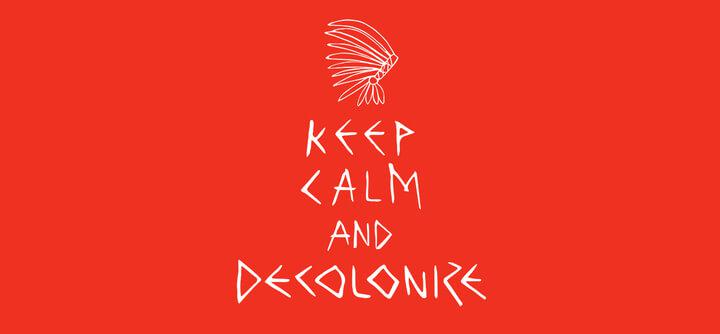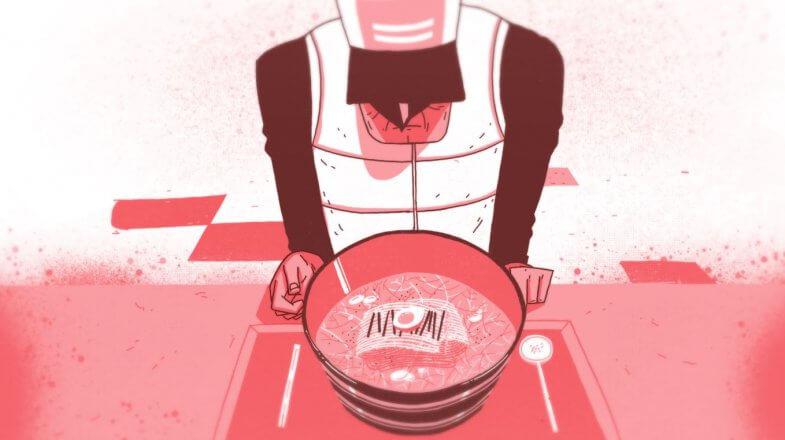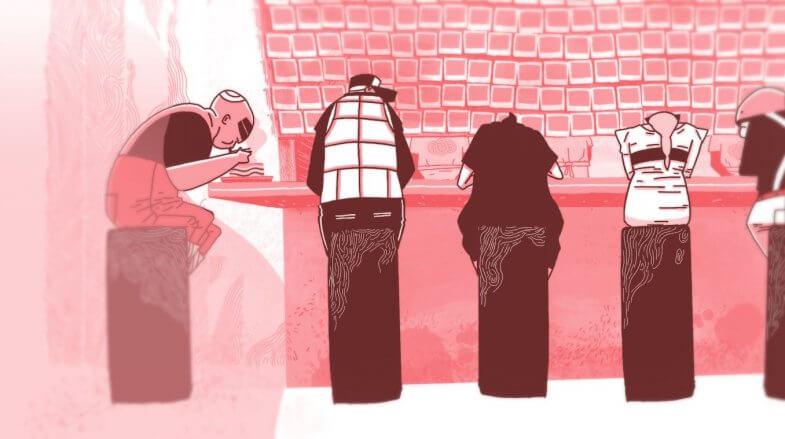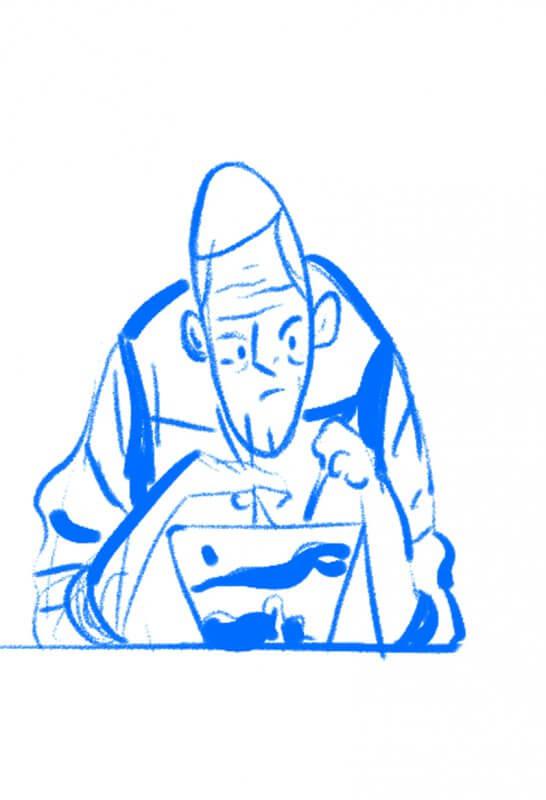Interview with Howie Shia (“Marco’s Oriental Noodles”)
Howie Shia, the Toronto-based artist, director and co-founder (alongside brothers Tim and Leo) of PPF House, has this year returned to the world of directing with Marco’s Oriental Noodles, part of Keep Calm and Decolonize, a series of films commissioned by CBC to mark 150 years of Confederation, in which five noted Canadian filmmakers were briefed by social activist and musician Buffy Sainte-Marie to present an alternative vision of a Canada that has embraced decolonization.
Marco’s Oriental Noodles, produced with the help of the National Film Board of Canada‘s Filmmaker Assistance Program (representing Howie’s fifth collaboration with the NFB following Ice Ages, Flutter, Peggy Baker: Four Phrases and 2015’s BAM), takes place in a hypothetical future in which a Saskatchewanian noodle shop has embraced a new culinary fashion of ‘psychedelic, polydimensional comfort food’, metaphorically addressing the ways in which colonization bleeds into everyday life, perfectly matching the director’s established style with hallucinatory visuals, vibrant animation and a witty script. We caught up with Howie Shia to learn more about his contribution to this engaging and enlightening series.
To start with it would be great to hear a bit about what you’ve been up to since we spoke to you about making BAM.
Mostly raising babies. I have a 2.5 year old girl and an 8 month old boy that make me very happy and very tired. Work-wise, I’ve been writing a lot. I have 2 graphic novels and a couple of children’s books that I have messy first drafts of. Because of how my days are with the kids, I’ve found I’ve gradually changed both my process and my material to accommodate short, intense bursts of work, instead of the long, ponderous days that I was used to. I mean, I’ve always enjoyed working in short form, but now I’m really trying to pair everything back to the bare minimum – just so that I can feel like I’ve actually accomplished something at the end of the day. So even on longer projects like the comics I’m doing, they’re largely structured in short scenes. “Today my job is to focus entirely on forming this thought; or crafting that joke; or establishing this environment or mood.” It’s actually quite satisfying. My dream had always been to be a daily strip cartoonist, and this is the closest I’ve come to doing that.
And of course, that includes any freelance work I take on too. Over the years, I’ve been lucky to have formed a nice working relationship with Donny McCaslin (band leader of David Bowie’s Blackstar band) and got to do a fun little promo for his newest album, Beyond Now. A kind of experiment with still drawings in 3D space that I’d had floating around in my head for a while.

Series artwork by Jaque Fragua
For those of us outside of Canada that may not be aware of it, what is Keep Calm & Decolonize all about?
Keep Calm and Decolonize is a series of short films commissioned by the CBC and curated by Jesse Wente, who is a really fascinating Canadian Ojibwe film programmer and cultural critic. The title comes from a statement Buffy Saint-Marie made recently during the backlash against the Canadian mainstream’s unabashed celebration of Canada’s 150th birthday. As with Thanksgiving, for all of the warm memories and pride that these holidays represent to the people celebrating them, Canada Day is by definition a celebration of the colonization and decimation of the land’s indigenous people. Jesse’s brief to the filmmakers was quite open-ended: he wanted us to consider a Canada that was either free or freeing itself from the structures and attitudes of colonization.
The five filmmakers chosen are a very humbling group of artists – Alanis Obomsawin, John Greyson, Yung Chang, Amanda Strong. Each one an iconoclast. I’m not entirely sure how I fit in.
How did you get involved in the series – were you approached based on your prior work, did you submit a pitch or was it a different process altogether?
As far as I know, I was approached based on prior work, which is quite flattering. I’ve been a long fan of Jesse Wente’s work and Carolynne Hew, the CBC’s executive producer on the project, is one of those people that everyone says “you have to work with.” Again, I feel really lucky to have been selected.

Marco’s Oriental Noodles (Dir. Howie Shia)
Can you elaborate on how you interpreted the theme and what made this film concept personal to you?
That’s a complicated one and it was a bit of a headscratcher for me at first. I’m the son of Chinese/Taiwanese immigrants, born and raised on the Canadian prairies, so I was familiar with the plight of the Canadian First Nations peoples – I grew up watching it play out in front of me – but I’m also not at first glance a victim of colonization – in many ways, I’m the beneficiary of it. There’s a weird thing in Canada where we often present multiculturalism as our crowning cultural achievement – and maybe it is – but multiculturalism and First Nations issues have for various complicated reasons generally been treated as separate political and social subjects in Canada. And where the former is our show piece, the latter is a really dark and complicated part of our past and present. So with all of that said, I wasn’t entirely sure that I even had a right to say anything on the matter. But then I was also in the middle of watching what was happening with Brexit and the US election; and what I kept coming back to when thinking about all of this stuff together was this idea that the colonizers were worried that they were losing the colony – indeed that they were being colonized – and that maybe part of the reason multiculturalism worked so well in the past was because it was set up with rules defined by the establishment. But once multiculturalism begins to step outside the boundaries of restaurants and ethnic festivals and across neighborhoods, into your work force and schools and laws, then it becomes something unwieldy and threatening. And that I felt like I could talk about – especially because I actually know and love a lot of good, smart people that were sympathetic to more populist politics than I naturally bend towards. I wanted to try to explore their concern with empathy instead of indigence or aggression.
As for the ramen bit, to be honest, it really just started with the fact that I wanted to draw people eating noodles. I tried other ideas out, but there was this instinct that the film had to be about food – trendy food. I think in the general pursuit of progressive politics and sensitivity against appropriation, food culture still often gets a pass. Every hipster in the western world is chasing down “authentic” ramen/tacos/falafels/whatever; but in a sense, the pursuit of authenticity is a way of holding a culture in place – cherry picking an era and region and politic and declaring that circumstance to be more authentic than any before or after. It’s not done with malicious intent, but there is definitely a sense of entitlement built into it. I’m certainly guilty of it on a regular basis.
Each of the films is identifiably unique and in keeping, to a certain extent, with the directors’ established style. Were you given free reign by CBC or were there certain parameters you needed to work within?
No, the project guidelines were very open–ended. Jesse really wanted us to make the films we wanted to make. You have to hand it to the CBC for respecting – even insisting on – our visions.

Marco’s Oriental Noodles (Dir. Howie Shia)
The sci-fi angle of Marco’s Oriental Noodles allows for a lot of visual richness in the metaphors the film carries across. How were these concepts developed from a story/art perspective?
I was a little surprised by the sci-fi thing myself, actually, but I think that too comes out of the current political climate. I’m not a hard core sci-fi fan, I’ve never successfully made sci-fi of my own before, but I do like it and one thing that became kind of stupidly obvious as I was researching the film was that sci-fi almost always happens in gigantic mega-tropolises. There are, of course exceptions – Firefly, Looper – but mostly the future is cold, dense, urbanity – and I think that’s quite an alarming judgement being made: the notion that in the future we will have no need for the people in small towns and rural communities; not their services, not their culture, certainly not their stories. And that seemed like a major oversight; but also a great opportunity to take what I knew about the prairies and push it forward just a bit. So everyone still drives trucks but hover trucks; and they still have strip malls, but now with ramen shops instead of burger joints; and they still wear baseball caps and vests, but maybe the cut is a little different and the material a little shinier.
Did you have any communication with other filmmakers involved in the series or were you largely left to your own devices?
We were left to our own devices. I haven’t even seen the others’ films yet. I’m really looking forward to it.
In the past we discussed your approach to colour, and certainly this film is uncompromising in its bold, near-monochrome shades of pink (and eventually reds). What ultimately determined this choice?
This time the colour choices simply go back to the fact that the film is set on the Canadian prairies. The man-made things on the prairies are very masculine and earth-toned, but the sky kind of softens all of that, especially at dusk and dawn when it goes through waves of these beautiful floral colours. The instinct when doing sci-fi is to go with cool colours, I think, but again, I wanted this to feel like the prairies; I wanted to sort of insist that this way of life was valid and would evolve in its own way, and would continue to succeed – would be, simply put, visible.
I recall that your film BAM marked a transition from animating entirely in Photoshop to TV Paint. Have you been able to dabble in any other softwares or processes when making this film?
This was the first film that I’ve made that is entirely digital – no paper drawings at all. It was a kind of experiment in quick-and-dirty, so I made of a point of simplifying the textures and line work such that the other artists I was working with could use whatever software would be best for them. I was travelling for a lot of the production and had to be mobile, so I did all of my drawing and animating in Procreate on the iPad Pro and then sequenced the frames in After Effects. Two of the other animators I had on the film, Pasquale La Montagne and Lillian Chan worked in Flash; and Jennifer Krick worked in Photoshop.
Are there any other current/future projects on the boil for yourself/PPF?
As I said, I’m working on several comics as well as some shorts. There’s a new NFB short that I’m co-directing with a really sharp live-action director named Jordan Canning; and a secret dance installation project that I’m very far behind on. I’d also love to find a way to continue exploring the world I created for this film. I’ve already written four other scripts set in Longbrook.
Keep Calm and Decolonize will air on CBC December 3rd. International viewers can see the films on the CBC Arts YouTube Channel


